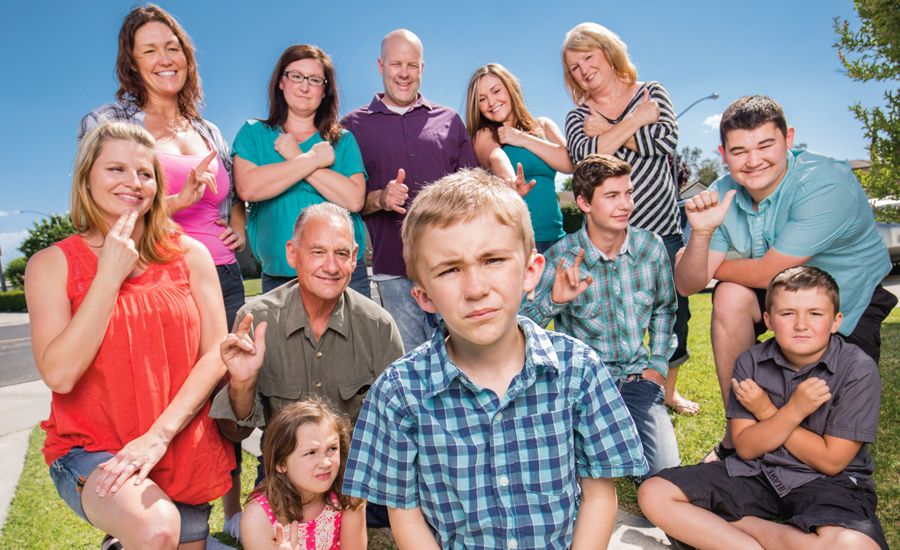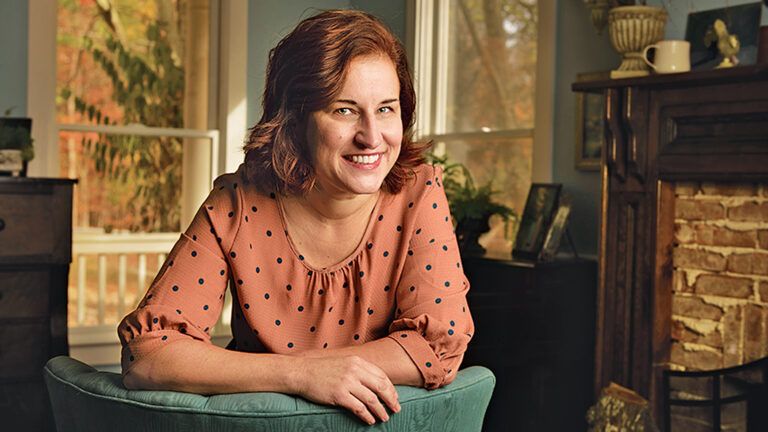I thought Zak was going to be my easiest baby. My husband, Robert, and I had a blended family of three sons—Kyle, 10, Cole, 7, and Zane, 2—by the time our youngest came along. I was way past all the new-mom anxieties. I knew what to expect with babies, especially boys.
That’s why I wasn’t concerned any more than the doctor was when Zak failed his first hearing tests. “Probably just fluid in his ear canal,” he said. “Take him to a specialist at three months. If there’s still an issue, he may need tubes to drain the fluid.”
There were no issues as far as I could tell. Zak was a sound sleeper, not fussy at all. When he was awake, he was plenty alert, taking in everything around him. If I walked up to his crib suddenly, his arms jerked outward—the newborn startle reflex.
At Easter dinner when he was six weeks old, my whole extended family couldn’t stop cooing over him, remarking on how attentive he was. He knew how to get my attention when he was hungry or needed his diaper changed.
He cried, louder than I remembered his brothers crying. But all I had to do was hold him and say, “I love you, pumpkin.” His eyes would meet mine, and he would settle down.
When Zak was three months old, we took him to the children’s hospital an hour and a half away for more testing. The audiologist inserted earbuds in Zak’s ears. Then she put electrodes on his head to register his brain’s response to the sound waves playing through the earbuds. The test took just a few minutes.
“There’s no question about the results,” the audiologist told us. “Your son has severe to profound sensorineural hearing loss.”
Robert and I were too shocked to respond. He gripped my hand. Finally I asked, “What does that mean?”
“Zak is deaf,” she said. “He wouldn’t hear jet engines even if he were standing right on the airport runway.”
The audiologist explained that Zak had congenital damage to the inner ear on both sides. “It can’t be surgically or medically corrected,” she said. “But you have options. When he’s old enough, Zak can learn to hear through cochlear implants. They bypass the damaged parts of the ear and stimulate the auditory nerve directly. He can learn sign language. Take some time to decide what’s best for him.”
READ MORE: BEVERLY SILLS ON THE POWER OF PRAYER
We left with a stack of informational handouts and the number of someone with the county education office who taught deaf and hard-of-hearing infants. On the way home, Robert drove. I called my parents and told them about Zak’s deafness. “I don’t understand,” Dad said. “He seems fine to me.”
I looked at Zak, sleeping in his car seat. He was the picture of contentment now, but what lay ahead for him? All I could see was a future of struggles. He’d be left out by other kids. Maybe even bullied.
What would happen if he grew up never hearing the voices of his parents, his brothers, his grandparents? Wouldn’t Zak feel cut off not just from the rest of the world, but also from the people who loved him most, his family? I was in tears by the time we pulled into our driveway.
Robert squeezed my hand again. “It’ll be okay,” he said. “We’ll get through this. God has plans for Zak.”
I couldn’t sit around waiting for God’s plans to unfold. Zak needed me! Robert worked long hours in commercial construction. He often left for a job site before the kids and I got up. It was up to me to take care of Zak day to day.
I called the infant teacher from the county. Her name was Diane. She came to the house to meet Zak and me. Learning sign language, teaching it to Zak, choosing a provider for cochlear implants, insurance questions, setting up a schedule for Diane to come by every week…there was so much to think about!
Despite Diane’s soothing manner, I felt overwhelmed and cried for almost the entire time she was there.
“The parent is the first and best teacher for a deaf child,” she said. “But that doesn’t mean you should take everything on yourself. You need a support network. People to help with errands, paperwork, babysitting. And just someone to talk to. Who do you have nearby?”
Family. My parents, my sister, her kids, my aunt and uncle, my cousin—they all lived close to us. But everyone, except my dad, who was retired, worked full-time.
“My family are all busy with their jobs, their own lives,” I said. “I can’t ask them to help me.”
Diane didn’t push. “Just think about it,” was all she said.
READ MORE: PRAYING WITH YOUR HANDS
I cried at every one of our sessions the first month. As if I were grieving a loss. And maybe I was. The loss of a normal, carefree childhood for Zak.
I saw our older boys off to school, read to Zane, played with him and Zak, but I did it all in a kind of haze, as if I was just going through the motions of being a mom. I used to love taking the younger boys to the park. I hardly ever left the house anymore.
I poked around online for information on sensorineural hearing loss. The more I read, the more daunting raising a deaf child seemed. Even my prayers asking God to help Zak didn’t seem to go anywhere.
“I feel hopeless,” I told Diane one week. “I just don’t know what to do for Zak.”
“You should really learn sign language,” she said. “Cochlear implants will help Zak hear, but it’s the brain that gives sounds and words their meaning. With signing, he’ll begin to develop language skills. And it’s not just about communication. It’s another way for you to connect with Zak.”
She showed me the sign for milk, pumping her hand as if she were milking a cow. “It’s time for him to eat, right?” she said. “Try making the sign right before you feed him.”
I filled a bottle with formula, then awkwardly pumped my hand before giving it to Zak. He didn’t seem to notice anything besides the bottle.
“It takes lots of repetition, but he’ll catch on,” Diane said. “The county offers a free sign-language program. Classes meet for eight weeks on Tuesday evenings. That’s something your family could do together.” I couldn’t see Robert wanting to go to a class after a long day at work, but when he heard about it he was excited.
“Sign us up! I’ll bet the boys will have fun,” he said. “Hey, why don’t you invite the rest of your family too?”
That would be asking a lot. Eight weeks was a huge commitment. Still, I had to try, for Zak. I called my parents.
“I don’t think we can take those classes,” Dad said. “They’re late in the evening and you know your mom has to be at work at five a.m.”
Somehow, instead of feeling defeated, I was motivated. I called my sister, my niece and nephew, my aunt, my cousin. I didn’t have to do any persuading. They said yes before I could finish asking. There would be nine of us in the class. But now I wanted everybody.
I drove to my parents’ house. Once I told them the rest of the family would be taking the class, they agreed. “We’ll figure it out,” Dad said. “Don’t worry.”
The class was in Signing Exact English, which uses the same vocabulary and grammar as standard English. There were other families there but none even close to the size of ours. We started with the alphabet, learning the letters so that we could eventually put them together to finger-spell words. “Go home and practice!” the teacher said.
The boys ran around the house signing to each other. Robert bought a signing phrase book so he could learn more on his own. My cousin Talena was a total whiz. Even my dad, who had trouble twisting his fingers to form certain letters, was making progress. Not Zak.
“Be patient,” Diane said. “It’ll come.” At our weekly sessions, she’d been working on building his vocabulary. Cereal, spoon, ball, bear. She’d put the object in front of Zak, show him the sign, then move his fingers to make it himself. “Turn everyday routines into signing lessons.”
I made sure to show Zak the milk sign every time I gave him a bottle. So far, not even a glimmer of understanding. Lord, why aren’t you helping Zak? I wondered. I know he can hear you.
When our class went on break for the holidays, no one in our family wanted to miss a session. So we met at our house. Talena led the lesson. I held Zak in my lap. He seemed engaged, his eyes following everyone.
At the end of class, we each stood and finger-spelled our names. Dad went last. Larry. The r sign was tricky for him. He had to use his other hand to position his fingers, but he did it.
READ MORE: PRAYER GAVE HER HOPE FOR THE FUTURE
“Way to go, Papa!” Kyle shouted.
The next thing I knew everyone was cheering, clapping, high-fiving, laughing. Even Zak clapped his chubby little hands together.
That isn’t the sign for “I get it!” but it sure felt like it. I finally saw that God was helping Zak. He had been from the very beginning, by giving Zak this big, busy family of ours. Busy learning sign language together, growing closer, becoming even more a part of one another’s lives, all out of love for one special little boy.
I’m convinced that love has helped Zak progress beyond our expectations. Almost miraculously he started signing on his own at eight months old. He was fitted with cochlear implants at 19 months. Today Zak is a happy, active seven-year-old who loves school (he goes to a center for deaf and hard-of-hearing children), video games and talking to everyone he meets.
Did you enjoy this story? Subscribe to Guideposts magazine.






